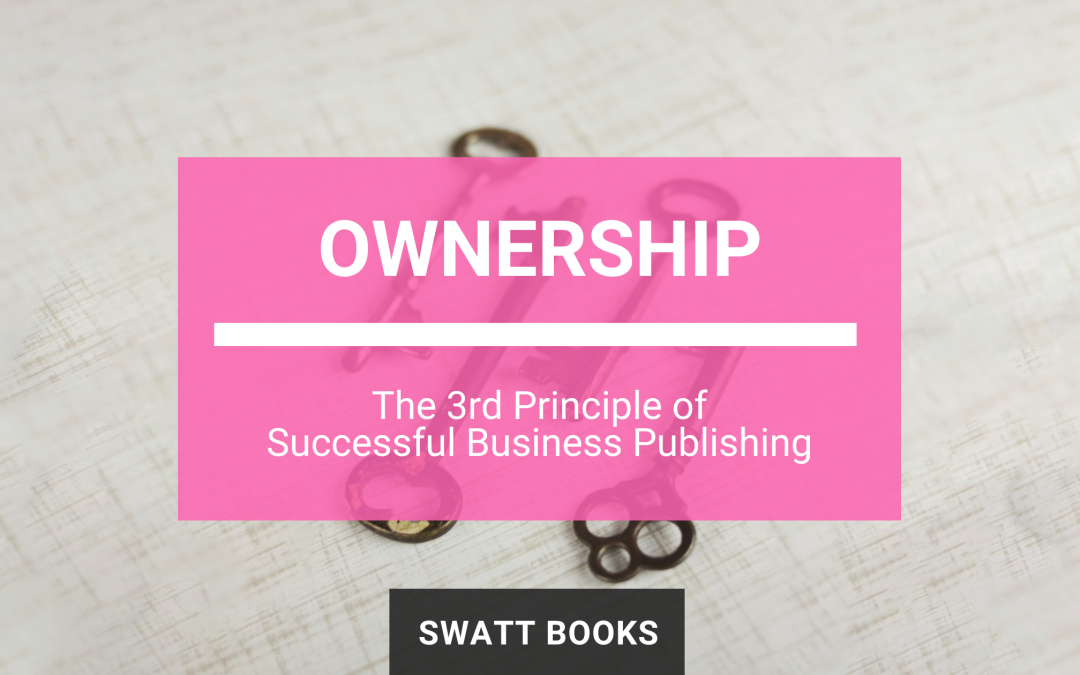Welcome to the third instalment of our five-part article series on the Principles of Successful Business Publishing. In the previous article, I introduced you to the principle of Quality and why it is vital to ensure that you publish a professional quality book that is a true reflection of your brand if you want your book to have a positive effect on you and your business.
The next principle is Ownership: maintaining end-to-end ownership of your rights and control over the publishing process. This principle is a very important one for business authors because it is the one that ensures you retain 100% of the rights, royalties, and control and ultimately governs how you protect your IP when publishing thought leadership content.
This is the primary point of difference between traditional publishing and self-publishing. In traditional publishing, rights are almost always solely owned by the publisher and not the author. You are in effect selling your book to a publisher to do with as they wish in exchange for an advance payment and a small percentage of sales profit. Whereas in a self-publishing model, the author IS the publisher and therefore retains all of the rights that would have been sold as part of the book deal.
I have nothing against the traditional publishing industry and believe that they continue to play a vital role in the book landscape. However, I strongly feel that if done correctly, professional self-publishing offers a much more agile and effective solution for business authors looking to publish a book to boost their profile, their brand, and their business. Here’s how self-publishing can do that:
1. Publishing Imprint
A key part of professional self-publishing is the registration of a publishing imprint under which the author will publish their own books. Hachette, HarperCollins, Bloomsbury, and MacMillan are all examples of publishing imprints. But by registering your own publishing imprint with the ISBN Agency for your territory, you create the foundation for maintaining full ownership of your work. It also signifies professionalism and acts to reinforce your brand identity.
2. ISBN Ownership
As I alluded to above, establishing your own publishing imprint allows the opportunity to purchase your own ISBNs (International Standard Book Numbers) which allows for robust identification and tracking of books through multiple editions and formats. This is linked to a central database that can be used for detailed sales monitoring as well as reinforcing your publishing copyright of the books you publish through your imprint.
3. Distribution Accounts
Once you have established your publishing imprint and assigned an ISBN to your book, you need a way of getting it out into the hands of your readers. This is where distribution accounts come in. Print-on-demand platforms like Amazon KDP and Ingram Spark help to remove the burden of book production and distribution from the shoulders of the author and centralise it to allow your book to be listed and sold by hundreds of online bookstores worldwide. However, the author needs to own their own accounts with these platforms to ensure full control of the book artwork, listing data, pricing and availability. Owning these accounts also allows you to control the flow of royalties and revenue to ensure that you receive and keep as much profit as possible from your hard work.
4. Sales Channel Control
Using platforms like Amazon KDP and Ingram Spark allows you to manage the distribution of your book into retail sales channels that specialise in books. But they also offer the ability for you to choose sales channels outside of the book trade that aligns with your brand and publishing goals. For example, selling via your own website, social media channels, or non-book-specific retail platforms like Etsy, eBay, or Patreon. Again, whilst allowing you to maintain control over all distribution and pricing decisions.
5. Distribution of Rights
Because professional self-publishing grants you 100% ownership of all rights pertaining to your book, it offers you the opportunity to sell partial rights to your book if an opportunity presents itself that aligns with your brand and vision. These rights can include territorial rights to allow a third-party publisher to republish your book in a specific territory that you want wider access to. Some authors will explore the possibility of retaining eBook rights separately from print rights to explore opportunities in digital distribution or the possibility of selling audiobook rights to help expand their reach into the growing audiobook market. And the most exciting potential is the growing popularity of selling subsidiary rights to allow for film, TV, or merchandise adaptations. All of which can help expand the reach of your book and grow your revenue potential.
By ensuring that you retain ownership of your rights and control over the publishing process, you can make decisions regarding your book independently of any outside controlling interest. This allows you to adapt to changing market conditions, take advantage of emerging technologies, and pivot your book and or marketing activities as needed.
It also grants you the ability to update and re-release future editions of your book to help increase its shelf life and extend the impact it can have on you and your business long term. This also applies to helping you maintain brand alignment between your business and your book as your business grows and evolves.
As a first-time author, it is vitally important that you take the time to educate yourself on the importance and impact of copyright and rights ownership so that you can make informed decisions throughout the publishing process. If you are unsure or feel you may need specialist advice about your individual market or circumstance, it is always prudent to seek the advice of legal counsel who specialises in IP and copyright law to ensure the protection of your rights and interests.





